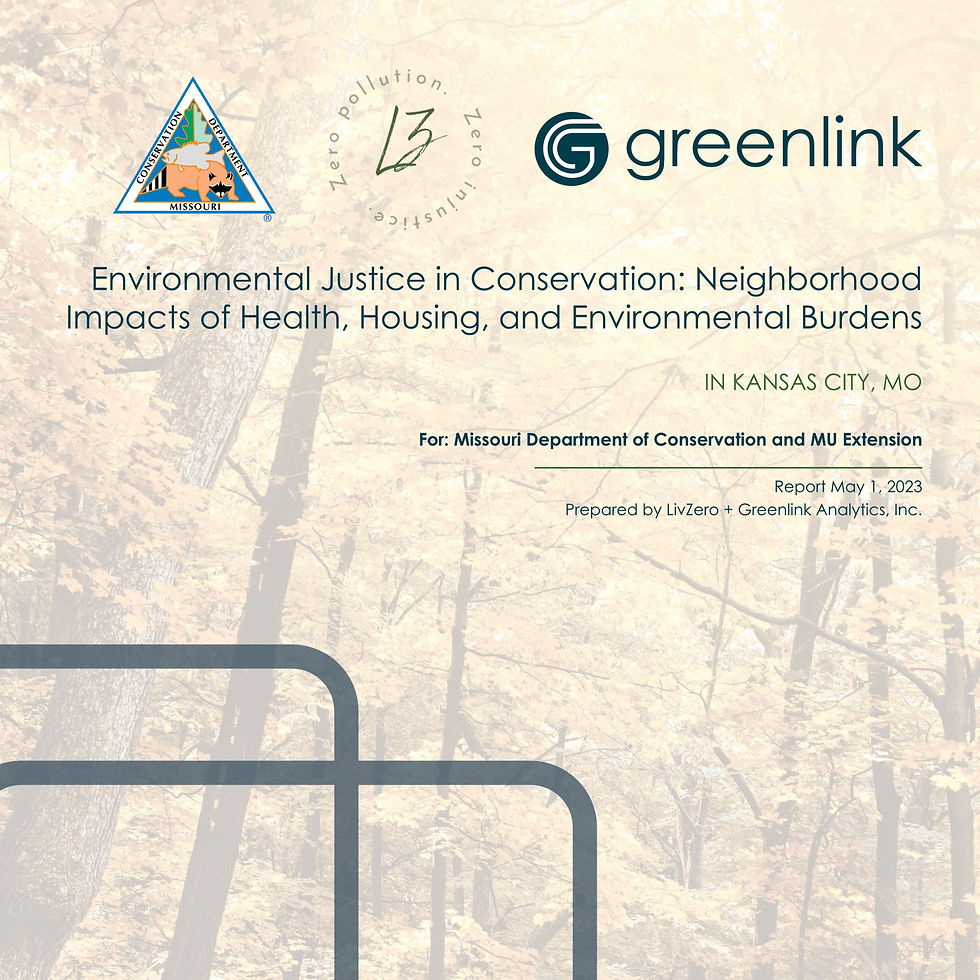“Unlikely Partnerships… Cool, But How?”
- Aug 16, 2023
- 2 min read
Guiding Co-creation Processes with Environmental Justice Communities

At the beginning of the year, our very own Greenlink Analytics, the Missouri Department of Conservation (MDC), a state agency that manages wildlife resources, and LivZero, a participatory research firm that works with community members to co-create climate solutions, joined in alliance to help facilitate a community-led conservation initiative in Kansas City, Missouri.
In the early days of 2022, MDC approached LivZero to build intellectual, financial, and personnel capacity for the creation of their Community Conservation Liaison Program — a community-driven initiative aimed to increase environmental safekeeping in Kansas City’s Tier I or environmental justice communities. It took a year for the procurement process to be finalized, after which the team got to work.
LivZero first approached Greenlink Analytics to help inform their community engagement process and assess conservation needs through a holistic lens. Together, they conducted a correlational analysis to better understand the relationship between multiple burdens, such as utility burden, asthma rates, tree canopy coverage, and heat intensity, plaguing Kansas City’s communities. The analysis outlined the census tracts and neighborhoods struggling with three or more inequities in the top 5%, or most burdened areas, as published in this report. With this information, LivZero began prioritizing and investing their efforts in these neighborhoods.
LivZero has deep relationships with MDC and Greenlink Analytics. Collectively, it is an unlikely alliance of a nonprofit, a for-profit, and a federal government entity with similar goals to address the intersecting burdens of historically forgotten, marginalized, and disinvested communities of the Kansas City, Missouri Metropolitan Area.
The intent of this alliance is to address the harm frontline communities (ones that experience the “first and worst” consequences of climate change) face by their already unjust conditions further exacerbated by the climate crisis. Each institution has agreed to take the back seat, let the community lead, and surrender any assumptions of what the community wants and needs.
With the right mix of trust, data science, community engagement, and public interest, data can be used in a way that sincerely enables ecological safekeeping, especially benefiting communities that endure the most burdens…and that just happen to benefit everyone else, too.
With the right mix of trust, data science, community engagement, and public interest, data can be used in a way that sincerely enables ecological safekeeping, especially benefiting communities that endure the most burdens.
By working together, we hope to create a new partnership and community engagement model that can be replicated across all of MDC’s regions, setting the precedent for other state entities looking to join forces with community partners, while showing the influence data analytics, used earnestly, can have on community-driven program and policy design.
There is much work to be done. We are committed to iterative processes. Building these unlikely alliances across various entities that aim to address community priorities and needs takes time. They are rooted in trust, calculated risks, and the art of listening. And that’s just what we need. We cannot operate in silos and expect systemic improvements.
For more information, please reach out to Angelica (Jellie) Chavez Duckworth, Director of Community Initiatives at Greenlink Analytics.





Comments